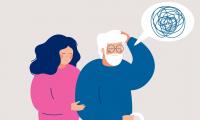A close reading of Samuel Beckett’s Krapp’s Last Tape by poet and literary scholar Ahmad Javaid at Off The School on Wednesday evening provided insight to many in attendance into how one should approach an absurdist literary piece.
Even If the speaker’s word-by-word explanation of the setting and starting monologue of the short play was hard for some (this scribe included) to fully comprehend, the introduction given by him on the literary movement of the Theatre of the Absurd enlightened all about how the Western literature suddenly changed its gear to express meaninglessness and futility of human existence in the wake of the two world wars, especially the Second World War.
Javaid said the Second World War completely shook up the project of enlightenment in Europe as it made European people think that all their advancement in science, knowledge, politics and warfare over other nations led them to nowhere but utter devastation.
At that time, people needed the catharsis of their pessimism about the destiny of humanity, and the Theater of the Absurd fulfilled that need as absurdist plays signified lack of meaning in life and futility of all ideologies, even questioning the Cartesian affirmation of the individual existence.
These plays, the scholar said, elevated the art of tragedy to such heights which even Shakespeare could not have imagined. The absurdist writers razed the firm boundary between the comic and the tragic and proved that even a laughter-inducing statement on its face could bring a stream of tears to one’s face.
Naming Beckett and Eugene Ionesco as the greatest exponents of the absurd theatre, Javaid said the absurdist plays brought the genre of tragedy from intellectual domain to existential sphere and successfully showed that the greatest tragedy that could befall human beings was the disconnection between their thoughts and existence.
The speaker said that due to the ‘miraculous’ art of Beckett and Ionesco, the movement of absurd theatre did not wane in a short time in the manner the earlier art and literary movements of surrealism, Dadaism and Cult of Ugliness had waned.
The introduction talk was followed by a close reading of Krapp’s Last Tape. Even its extremely short length could not help the speaker complete his word-by-word explanation in around two hours.
Javaid said the apparently disconnected sentences filled with pauses spread over the play from its beginning till the end had been meticulously crafted by Beckett and had layers of meaning. He went to great lengths explaining pauses and also mentioned how some linguistically incorrect phrases like “feels about” and “hard of hearing” exaggerated the theme of futility of every organised or structured thing in our existence, including the language.
The speaker went to great lengths to explain the setting of the play written by Beckett. The starting description of Krapp, the only character in the play, with sentences such as “Rusty black narrow trousers too short for him. Rust black sleevless waistcoat, four capacious pockets” were highly praised by him.
“Very near-sighted (but unspectacled). Hard of hearing” was another description of Krapp by Beckett that the speaker appreciated. He said the use of ‘very’ with ‘near-sighted’ was linguistically inappropriate but Beckett used it to heighten the irony created by the following phrase in parenthesis “(but unspectacled)”. The literary scholar said that the use of “very” could also be interpreted as that spectacles would have helped Krapp if he was near-sighted but since in this case, he is “very near-sighted”, spectacles are of no use to him.
The theme and stylistics of the short play reminded of arguably Beckett’s masterpiece ‘Waiting for Godot’, which is also about the futility of human endeavours and the meaninglessness of life. However, ‘Waiting for Godot’ is a lengthy play with multiple characters.
But it also triggered the thought whether the absurd theatre had anything else to say about the human existence beyond the single idea of futility and meaninglessness, and whether or not a reader interested in theatre would be bored by such plays after reading one or two specimen, especially when the Second World War is no longer an event of recent past.
One may also wonder what the touchstone would be to discredit disconnected sentences in any other writing as bad literature if similar disconnected sentences in Krapp’s Last Tape have a created a literary masterpiece.















